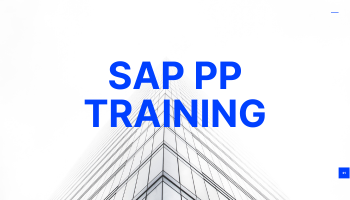Your cart is currently empty.
SAP PP, or Production Planning, is a module within the SAP ERP (Enterprise Resource Planning) system that focuses on planning and managing various aspects of the production process in an organization. SAP PP integrates with other SAP modules to provide a comprehensive solution for production planning and execution. Here are key details about SAP PP

Online-Classroom
3 Months Duration
Live Class Facilities
Interviews Assured
Live Server
SAP PP, or Production Planning, is a module within the SAP ERP (Enterprise Resource Planning) system that focuses on managing and optimizing the production processes of an organization. It is designed to help businesses plan, execute, and monitor manufacturing processes efficiently. SAP PP integrates with other SAP modules to provide a comprehensive solution for production-related activities. SAP PP is widely used across industries, including discrete manufacturing, process manufacturing, and automotive, to enhance production efficiency, reduce costs, and improve overall supply chain management.
A well-structured training program should cover the essential topics and modules within the SAP domain. This includes core modules such as SAP HANA, SAP ABAP, SAP MM, SAP SD, SAP FI, and others, depending on the specific training focus.
: Practical exposure is crucial. Effective training programs often include hands-on exercises, real-world scenarios, and access to a live SAP system for practical application of concepts.
Trainers with practical experience and expertise in SAP can provide valuable insights and real-world examples, enhancing the overall learning experience.
: Engaging with real-life projects and case studies allows participants to gain practical experience and apply SAP concepts in actual business scenarios.
If certification is a goal, a good training program may include preparation for SAP certification exams. This might involve practice exams, study materials, and guidance on the certification process.
Different individuals have different learning preferences. Look for training programs that offer flexibility, such as classroom training, online instructor-led sessions, or self-paced e-learning modules.
Access to additional resources, forums, or consultation after the training can be beneficial for participants as they apply their skills in real-world situations.
Some training providers offer career guidance, resume building, interview preparation, and job placement assistance, supporting participants in their career development.
An interactive learning environment, including discussions, Q&A sessions, and collaboration with fellow participants, enhances the overall learning experience.
The SAP ecosystem evolves, so training content should be up-to-date with the latest advancements in SAP and related technologies.
MM
SD
QM
WM
FI
Via SAP PP Consultant, As an SAP PP consultant, you can work directly with organizations to implement, customize, and optimize SAP PP solutions. This role involves understanding client requirements, configuring the system, and providing ongoing support for SAP PP modules.
Via Production Planner,Organizations often seek production planners who can use SAP PP to create and manage production plans based on demand forecasts, sales orders, and other relevant data. This role involves scheduling production orders and ensuring efficient use of resources.
Via Master Data Analyst,SAP PP-trained professionals can specialize in master data management, ensuring accurate and up-to-date information related to materials, bills of materials (BOMs), work centers, and routing.
Via Materials Planner,Materials planners use SAP PP to manage material requirements, ensuring that the necessary materials are available in the right quantities to support production schedules.
Via Shop Floor Controller,This role involves overseeing and managing production activities on the shop floor in real-time. SAP PP skills are valuable for monitoring production orders, managing work centers, and ensuring timely completion of production tasks.
Via SAP Project Manager,Individuals with SAP PP expertise can move into project management roles, overseeing ERP implementation projects and ensuring the successful deployment of SAP PP solutions.
Via Supply Chain Analyst,: SAP PP-trained professionals can work as supply chain analysts, focusing on optimizing production processes, reducing costs, and improving overall supply chain efficiency.
Via Quality Management Specialist,Integration between SAP PP and SAP Quality Management (QM) is critical. Professionals with SAP PP training can specialize in quality management, ensuring that quality checks and inspections are seamlessly integrated into the production process.
Via Business Analyst - Production and Manufacturing,Business analysts with SAP PP skills can analyze and optimize production and manufacturing processes, aligning them with business goals and strategies.
Via Logistics Coordinator/Manager:,SAP PP-trained individuals can pursue roles in logistics, managing the movement of goods, coordinating transportation, and ensuring smooth logistics operations.
Via Demand Planner,: Demand planning involves forecasting future demand for products. SAP PP skills are beneficial for individuals involved in creating accurate demand forecasts and aligning production plans accordingly.
Via Continuous Improvement Specialist,Professionals with SAP PP training can focus on continuous improvement initiatives, identifying areas for efficiency gains and implementing process improvements within the production and manufacturing processes.